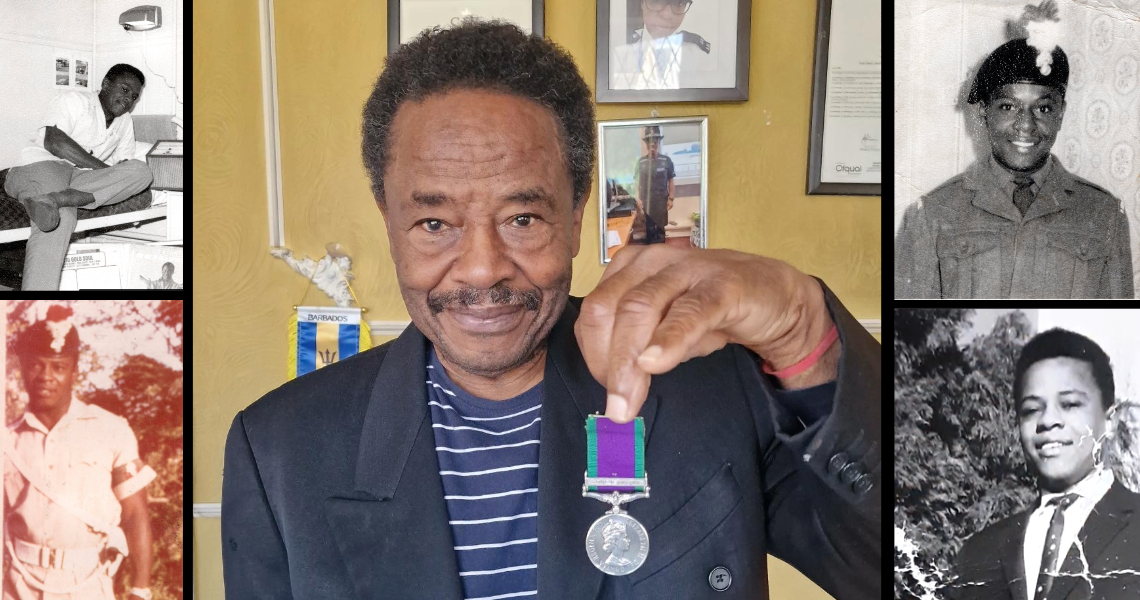Lest we forget: the peace-keeping battalions
Published: 09 November 2023
Gordon Murrell, a resident of Wanstead for the last 30 years was an integral part of the aftermath of the second world war. He and his comrades were key to ensuring peace prevailed in the long-term, despite being too young to fight in the 1940s, and not yet born when World War 2 started.
Wanstead’s Gordon Murrell was born in Barbados, and spent his childhood in its sunny climate, a choir boy in a parish called St George. Named after England’s patron saint, Gordon says people living there felt a closeness to our country, which was encouraged from the beginnings of primary school. There was a lion statue in the town centre, similar to the ones we see in Trafalgar Square in central London. “There’s even a Wanstead in Barbados,” Gordon tells us.
Gordon came to Britain to join the British Army, having seen the ‘Your Country Needs You’ Lord Kitchener posters in his home town. Gordon at 18 years old, wanted to travel the world, and to live in the England he’d heard so much about as a child, so he signed up, said goodbye to his family, and bravely and optimistically began a new life in the UK.
Over 600 people joined the British Army after the war, many from Commonwealth countries. Once trained, Gordon worked as a peace-keeper, and he was posted to Berlin 1962. This is a stark reminder that although we learn about the war finishing in 1945, work continued by many of our country’s and indeed Redbridge’s own brave troops, who remained in their postings across Europe and around the world. Many of these service people had come from countries like Barbados, all driven to serve our country.
“There’s even a Wanstead in Barbados.”
Gordon’s posting in Germany, with his colleagues, meant he was given the task of helping to keep lasting peace, and to help reduce any remaining tensions in Berlin. They trained relentlessly to be ready should our forces once again be required to act.
Unfortunately, the reality of being an immigrant, and a black person in the British Army did not meet Gordon’s expectations. He faced severe racism throughout his time both in the army, and off duty. He wasn’t welcome in pubs, and it was difficult for him to find a landlord willing to let him rent a flat – simply due to his skin colour in 1960s Britain. “It’s better today, but racism is still there – under the surface,” Gordon notes.
“We must remember this generation. The resilience they had to have, the things my dad has had to overcome to be here today.”
Gordon, too proud to return to Barbados, and still dedicated to the job he signed up for, pressed ahead with his army career, serving our country for a number of years. His mother’s words rang in his ears whenever he felt unhappy about his treatment here, “Whatever your situation, you must try your best, and don’t do anything that would embarrass me.” Having trained in Newcastle he proudly speaks of working as part of NATO to keep the peace in Germany and then in Aden, at times alongside the Irish Fusiliers, the Tank Regiment and the Scottish Guard.
As Gordon prepared to eventually leave the British Army, he went to night school so he could be sure he had the best chance of securing a good job. His wife was a nurse for the NHS, and later his daughter served as a police officer. A family clearly dedicated to public service.
Tragedy has struck Gordon’s life a number of times. Firstly with the passing of his son, Rodney, from an asthma attack at just 18 years old, the same age that Gordon had begun his new life in the UK. Sadly, Gordon’s wife passed away from cancer some time later. This was a man who was resilient, who had courage and who bravely travelled to new countries to protect people, so although utterly devastated by losing two of the people closest to him, he carried on and raised his young daughter, Kelly, by himself.
Kelly remarks, “We must remember this generation. The resilience they had to have, the things my dad has had to overcome to be here today.”
Gordon Murrell rightly received a beautiful medal for his service to our country. Sadly it had been damaged over time, but Kelly helped her father take it to BBC’s The Repair Shop, where he featured in series 12 as the programme’s restorers brought it back to life with a new ribbon, the dent fixed, and gleaming after a good polish. It now shines in its box in his front room.
As Gordon stands for a photograph, proudly holding his medal, he reflects on what Remembrance Day means to him.
“I remember those who died and who served in war. I remember those who suffered terribly and those who tried to keep the peace. Unfortunately humans are not good at learning from the past, but it’s important we remember and we learn, to prevent these things happening again.”

